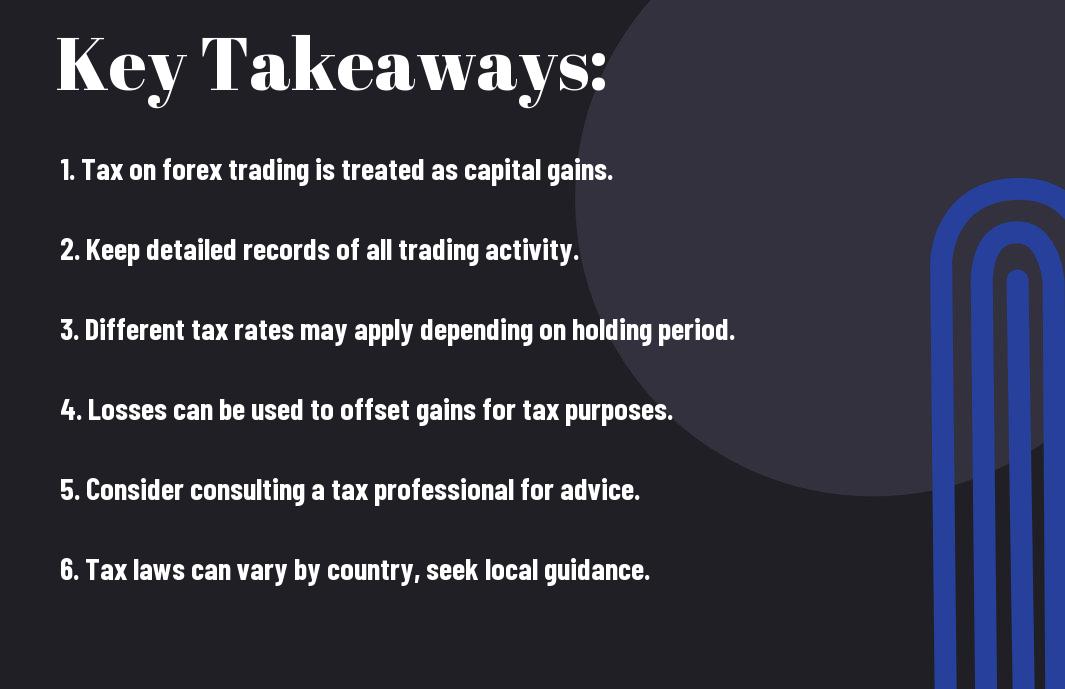Overwhelmed by the intricate world of forex trading and taxes? Let us guide you through the inner workings of how forex traders pay tax. Understanding the tax implications of your forex trading profits is crucial to avoid any penalties or legal trouble. We will break down the key aspects of tax obligations for forex traders, including how profits are taxed, what expenses can be deducted, and how to stay compliant with tax laws. Stay informed and in control of your finances as we unravel the complexities of tax responsibilities for forex traders.
Key Takeaways:
- Forex trading income is taxable: Any profits made from forex trading are subject to taxation by the IRS. It is crucial for forex traders to keep accurate records of their trading activities for tax reporting purposes.
- Capital gains tax on forex trading: Profits from forex trading are typically considered capital gains and are subject to either short-term or long-term capital gains tax rates, depending on the duration the trade was held.
- Deductible expenses for forex traders: Forex traders can potentially deduct certain trading-related expenses, such as trading platform fees, data subscriptions, and other costs directly related to their trading activities, which can help offset their taxable income.

Understanding Forex Trading Income
Defining Taxable Events in Forex Trading
Some forex traders may not be aware of the tax implications of their trading activities. Understanding what constitutes a taxable event in forex trading is crucial for complying with tax laws and avoiding penalties.
Types of Forex Trading Income
Trading income in forex can take various forms, such as capital gains, interest income, dividends, commission income, and spread betting gains. After evaluating your trading activities, you can determine the type of income generated and how it should be reported for tax purposes.
| Capital Gains | Profits made from the sale of assets such as currency pairs |
| Interest Income | Earnings from interest on margin accounts |
| Dividends | Income received from investments in currency pairs |
| Commission Income | Profits generated from brokerage fees |
| Spread Betting Gains | Profits from spread betting on currency movements |
It
Any income generated from forex trading is subject to taxation. It is important to keep detailed records of your trading activities to accurately report your income and comply with tax laws. Understanding the different types of trading income can help you determine how to report your earnings correctly to the tax authorities.
Tax Reporting Requirements for Forex Traders
Documentation and Record-Keeping
Many forex traders underestimate the importance of proper documentation and record-keeping when it comes to tax reporting. With the volatile nature of the forex market, it is crucial to keep track of all transactions, including buys, sells, gains, and losses. Without accurate records, it can be challenging to report your income and deductions correctly to the tax authorities.
Filing Taxes: Deadlines and Forms
Record-keeping is vital for forex traders when it comes time to file their taxes. It is important to stay informed about the deadlines and forms required by the IRS for reporting forex trading activity. Failure to file on time or accurately can lead to serious consequences, including penalties, fines, and even legal action. Traders must ensure they have all the necessary paperwork in order to comply with tax regulations.
Documentation such as trading account statements, transaction records, and profit/loss reports should be kept organized and easily accessible. It is recommended that traders consult with a tax professional to ensure they are meeting all tax reporting requirements and maximizing their deductions within the legal framework.
Tax Deductions and Strategies
Deductible Expenses for Forex Traders
Traders engaging in forex trading can benefit from various deductible expenses that can help lower their tax liability. These expenses may include trading software, data subscriptions, internet fees, and office supplies. It is vital for traders to keep detailed records and receipts of these expenses to validate their deductions during tax filing.
Strategic Tax Planning for Forex Trading
The key to minimizing tax liability for forex traders lies in strategic tax planning. By taking advantage of tax-efficient investment accounts, such as an Individual Retirement Account (IRA) or a Solo 401(k), traders can defer taxes on their trading profits. Additionally, utilizing tax-loss harvesting strategies can help offset gains and reduce overall tax obligations.
This strategic tax planning can significantly impact a trader’s bottom line by maximizing tax savings and optimizing overall profitability. It is crucial for forex traders to work with a tax professional who understands the complexities of forex trading and can help devise a customized tax strategy tailored to their specific situation.
International Considerations
Dealing with Multiple Jurisdictions
All forex traders must navigate the complex landscape of international tax laws when conducting trades across multiple jurisdictions. It is crucial to understand the tax implications in each country where trades are executed to ensure compliance with regulations and avoid penalties. Different countries have varying tax rates, reporting requirements, and regulations that can significantly impact the profitability of forex trading.
Tax Treaties and Their Impact on Forex Traders
Any forex trader operating internationally must be aware of tax treaties between countries and the impact they have on taxation. Tax treaties play a crucial role in determining which country has the right to tax specific types of income, including income generated from forex trading. These treaties can prevent double taxation and provide relief for traders, but they can also introduce complexities that require careful consideration.
Dealing with tax treaties requires a thorough understanding of the specific agreements between countries involved in forex trading. It is imperative to consult with a tax professional who specializes in international tax law to ensure compliance and optimize tax planning strategies. Failure to consider tax treaties can result in unexpected tax liabilities and penalties that can significantly impact the profitability of forex trading activities.
Final Words
Conclusively, understanding how forex traders pay tax is crucial for every investor to ensure compliance with the tax laws of their country. Different regulations and guidelines may apply depending on the jurisdiction, trading volume, and other factors. It is recommended for traders to keep accurate records of their trades, profits, and losses throughout the year to make tax filing more straightforward. Consulting with a tax professional or accountant who is knowledgeable about forex trading tax laws can provide valuable guidance and assistance in navigating this complex process. By staying informed and proactive in managing their tax obligations, forex traders can operate within the legal framework and focus on their trading strategies with peace of mind.
FAQ
Q: Do forex traders need to pay taxes?
A: Yes, forex traders are required to pay taxes on their trading profits. The profits earned from trading forex are considered taxable income and must be reported to the tax authorities.
Q: How are taxes calculated for forex trading?
A: Taxes on forex trading are calculated based on the net profits earned during a specific tax year. The net profit is determined by subtracting your total losses from your total gains. This net profit amount is then added to your overall income for the year and taxed according to your tax bracket.
Q: What are some common tax deductions for forex traders?
A: Forex traders can often deduct expenses related to their trading activities, such as trading software, internet expenses, office supplies, and educational materials. It is important to keep detailed records of these expenses and consult with a tax professional to ensure proper deductions are taken.
